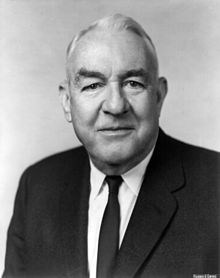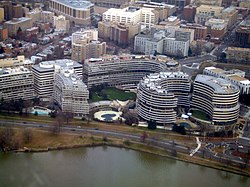Sam Ervin
From Wikipedia, the free encyclopedia
"Ervin gained lasting fame through his stewardship of the Senate Select Committee to Investigate Campaign Practices, also known as the Senate Watergate Committee, from the 1972 presidential election.(that led to the resignation in 1974 of President Richard Nixon)"
| Sam Ervin | |
|---|---|
 | |
| United States Senator from North Carolina | |
| In office June 5, 1954 – December 31, 1974 | |
| Preceded by | Clyde R. Hoey |
| Succeeded by | Robert B. Morgan |
| Member of the U.S. House of Representatives from North Carolina's 10th district | |
| In office January 22, 1946 – January 3, 1947 | |
| Preceded by | Joseph W. Ervin |
| Succeeded by | Hamilton C. Jones |
| Personal details | |
| Born | Samuel James Ervin, Jr. September 27, 1896 Morganton, North Carolina |
| Died | April 23, 1985 (aged 88) Winston-Salem, North Carolina |
| Nationality | American |
| Political party | Democratic |
| Spouse(s) | Margaret Bell Ervin |
| Alma mater | University of North CarolinaHarvard Law School |
| Religion | Presbyterian |
| Watergate scandal |
|---|

|
| Events |
| People |
Samuel James "Sam" Ervin, Jr. (September 27, 1896 – April 23, 1985) was an American politician. A Democrat, he served as a U.S. Senator from North Carolina from 1954 to 1974. A native of Morganton, he liked to call himself a "country lawyer," and often told humorous stories in his Southern drawl.[1] During his Senate career, Ervin was a legal defender of the Jim Crow laws and racial segregation, as the South's constitutional expert during the congressional debates on civil rights.[2] Unexpectedly, he became a liberal hero for his support of civil liberties. He is remembered for his work in the investigation committees that brought down Senator Joseph McCarthy in 1954 and especially his investigation in 1972 and 1973 of the Watergate scandal that led to the resignation in 1974 of President Richard Nixon.
No comments:
Post a Comment